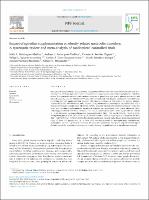Impact of spirulina supplementation on obesity-related metabolic disorders: a systematic review and meta-analysis of randomized controlled trials
Related Resource(s)
https://www.sciencedirect.com/science/article/pii/S2352364621000237Date
2021-11Author(s)
Bohórquez Medina, Sofía L.
Bohórquez Medina, Andrea L.
Benites Zapata, Vicente A.
Ignacio Cconchoy, Felipe L.
Toro Huamanchumo, Carlos J.
Bendezu Quispe, Guido
Pacheco Mendoza, Josmel
Hernandez, Adrian V.
Metadata
Show full item recordAlternate title
Impacto de la suplementación con espirulina en los trastornos metabólicos relacionados con la obesidad: una revisión sistemática y un metanálisis de ensayos controlados aleatorios
Abstract
Spirulina is a cyanobacterium rich in proteins, polyunsaturated fatty acids, and bioactive compounds, such as C-phycocyanin, which has anti-inflammatory and antioxidant properties and possible lipid and glucose metabolism effects. This systematic review aimed to analyze the effects of spirulina on lipid profile, glucose metabolism, and anti-inflammatory markers (CRD42018097156). After systematically searching for randomized controlled trials evaluating spirulina supplementation in adults with obesity, diabetes, or dyslipidemia on Scopus, Embase, PubMed/MEDLINE, Web of Science, and Cochrane Library databases and assessing the risk of bias (Rob 2.0), a random-effects meta-analysis (Mean Difference, CI 95%) was conducted on seven selected articles (n = 338). We found that spirulina supplementation significantly reduced the triglycerides (TG) (mean difference (MD): −15.34 mg/dL; 95% CI: −29.76 to −0.91) and total cholesterol (TC) levels (MD: −11.83 mg/dL; 95% CI: −20.56 to −3.10). However, low-density lipoprotein cholesterol (LDL-C) (MD: −7.80 mg/dL; 95% CI: −16.94 to 1.33), fasting blood glucose (FBS) (MD: −3.38 mg/dL; 95% CI: −9.88 to 3.12), and glycosylated hemoglobin (HbA1c) (MD: −0.27%; 95% CI: −0.94 to 0.39) levels were not significantly reduced. High-density lipoprotein cholesterol (HDLsingle bondC) (MD: 0.73 mg/dL; 95% CI: −2.49 to 3.94) was also increased but not significantly. Spirulina supplementation resulted in a decrease in TG and TC levels; it improved the lipid profile of patients with type 2 diabetes, metabolic syndrome, overweight, or obesity, showing its significant role as an adjuvant treatment.
Collections
- Artículos científicos [891]






